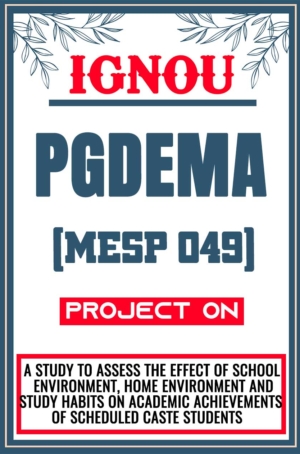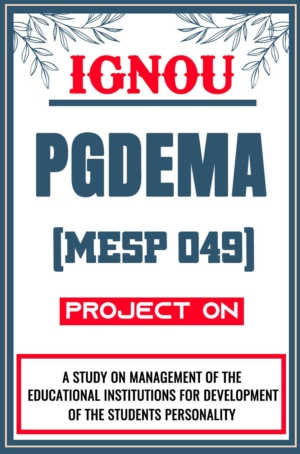Download IGNOU PGDEMA Project (MESP 49)
IGNOU PGDEMA Project given by IGNOU has been developed to provide a holistic perspective of the academic as well as practical areas of education to the learner. For the advancement of leraners performance as educational managers and leaders in various area writing and submitting IGNOU PGDEMA Project is crucial. This IGNOU PGDEMA Project also helps in decision making and addressing difficulties.
Whatsapp us to get the Personalized (Customized) or Readymade IGNOU PGDEMA Project Report or PGDEMA Synopsis
IGNOU PGDEMA Project Topics (MESP 49)
- Occupational Stress & Job Satisfaction: A Comparative Study Of Teachers In Government And Private Colleges
- A Study Of The Management Of The Educational Institutions For Development Of The Students’s Personality
- Job Burnout And Coping Mechanisms Among Primary And High School Teachers
- Perception Of Faculty Members In The Management Institutes Regarding The Implementation Of Tqm Practices In Management Institutes
- Occupational Stress & Job Satisfaction Among Teachers Of Different Age Groups
- A Study About Computer Awareness Among Secondary School Students
Why is the IGNOU PGDEMA Project (MESP 49) important?
The IGNOU PGDEMA Project holds importance for several reasons:
- Applying Learned Knowledge: It allows you to take the theoretical knowledge gained through the PGDEMA program and apply it to a real-world scenario in educational management. You’ll get to explore a specific issue or challenge in depth, analyzing it through a research lens.
- Developing Research Skills: The project hones your research abilities. You’ll learn to formulate a research question, conduct literature reviews to gather information, choose appropriate data collection methods, analyze data, and draw well-supported conclusions.
- Problem-Solving Approach: The project fosters a problem-solving mindset. By investigating a specific concern in educational management, you’ll gain experience in identifying problems, analyzing causes, and proposing potential solutions. This can be valuable in your professional career.
- Critical Thinking and Analysis: The project refines your critical thinking and analytical skills. As you delve into your research topic, you’ll learn to evaluate information critically, identify biases, and form well-reasoned arguments based on evidence.
- Enhances Communication Skills: Writing a comprehensive project report strengthens your written communication skills. You’ll need to present your research clearly, concisely, and in a well-organized manner.
- Boosts Confidence: Successfully completing the MESP 49 project can boost your confidence in your research and analytical abilities. This sense of accomplishment can be motivating as you pursue your career in educational management.
Do you need to collect primary data for your IGNOU PGDEMA Project (MESP 49)?
The IGNOU PGDEMA Project doesn’t necessarily require you to collect primary data, but it can be a strong option depending on your research topic. Here’s a breakdown of your options:
Using Existing Data (Secondary Data):
You can complete a strong project by solely using existing or secondary data. This data can come from various sources like:
- Government reports and publications on education.
- Educational research journals and articles.
- Reports from educational institutions or organizations.
- Databases and websites related to education.
This approach can be time-saving and convenient, especially if your topic aligns well with existing research.
Using Primary Data:
Collecting primary data allows you to explore a fresh angle or gather information specific to your research question. There are different methods for primary data collection, including:
- Surveys and questionnaires: Useful for gathering information from a large group of people.
- Interviews: In-depth discussions with key informants or stakeholders.
- Case studies: Examining a particular educational institution or program in detail.
- Observations: Directly observing practices or behaviors in educational settings.
Collecting primary data can strengthen your research and offer unique insights, but it requires more time, resources, and planning compared to using secondary data.
Choosing the Right Approach:
The decision to use primary data depends on several factors:
- Your research question: Does it require gathering new information or can it be addressed using existing data?
- Availability of secondary data: Is there enough relevant and high-quality existing data on your topic?
- Feasibility of collecting primary data: Do you have the time, resources, and access required for data collection methods like surveys or interviews?
- Your interests and skills: Consider if you’re more comfortable analyzing existing data or conducting primary research.
Consulting Your Guide:
Ultimately, it’s best to discuss your research topic and data collection options with your assigned guide. They can help you assess the feasibility of each approach and choose the method that best aligns with your research goals and the program requirements.
Is there a specific format for the IGNOU PGDEMA Project Report (MESP 49)?
Yes, the IGNOU PGDEMA Project report follows a specific format. While IGNOU might not have a strictly enforced style guide, there’s a generally accepted structure for the report. Here’s a breakdown of the common sections:
Preliminary Pages:
- Title Page: This includes your project title, your name, enrollment number, program details, guide’s name, and submission year.
- Certificate: A declaration signed by you stating the originality of your work and that it hasn’t been submitted elsewhere.
- Acknowledgement (Optional): You can express gratitude to your guide, faculty members, or anyone who provided significant help with your research.
Main Report:
- Introduction: This section provides an overview of your research topic, highlighting its significance in the field of educational management.
- Literature Review: Here, you’ll critically analyze existing research related to your chosen topic.
- Research Methodology: This section explains your research design, data collection methods (primary or secondary), and data analysis techniques.
- Data Collection and Analysis: This part details how you collected your data (if applicable) and presents your findings through tables, charts, or other relevant formats.
- Results and Discussion: Here, you’ll interpret your findings, explain their meaning in relation to your research question, and discuss their implications for educational management.
- Conclusion and Recommendations: Summarize your key findings, conclusions drawn from your research, and offer practical recommendations for addressing the issue you investigated.
- References: This section provides a complete list of all sources you cited in your report, following a standard referencing style like APA or MLA.
Is there a preferred method for data collection?
The IGNOU PGDEMA Project (MESP 49) doesn’t have a single “preferred” method for data collection. The most suitable approach depends on your research question and the specific topic you’ve chosen. Here’s a breakdown to help you decide:
Understanding Your Research Question:
The core factor influencing your data collection method is your research question. Ask yourself:
- Does your question require gathering new information from a specific group of people (students, teachers, administrators)? If so, primary data collection might be ideal.
- Can your question be addressed by analyzing existing data and research on the topic? If good secondary data is available, it can be a strong option.
Considering Feasibility:
- Think about the feasibility of each approach. Primary data collection through surveys or interviews can be time-consuming and require resources to reach participants.
- Secondary data collection might be quicker if relevant data exists, but finding high-quality and directly relevant sources can also take effort.
Your Skills and Preferences:
- Consider your own research skills and preferences. Are you comfortable designing and conducting surveys or interviews? Or do you feel more confident analyzing existing data and research papers?
Here’s a quick overview of common data collection methods to consider:
Primary Data Collection:
- Surveys and Questionnaires: Effective for gathering information from a large group of people.
- Interviews: In-depth discussions with key informants or stakeholders to gain rich insights.
- Case Studies: Examining a particular educational institution or program in detail.
- Observations: Directly observing practices or behaviors in educational settings.
Secondary Data Collection:
- Government reports and publications on education
- Educational research journals and articles
- Reports from educational institutions or organizations
- Databases and websites related to education
Consulting Your Guide:
The best approach is to discuss your research question and data collection options with your assigned guide. They can advise you on the feasibility of each method and help you select the one that best aligns with your research goals and program requirements.
What are common mistakes to avoid in the IGNOU PGDEMA Project (MESP 49)?
Here are some common mistakes to avoid while undertaking the IGNOU PGDEMA Project:
Topic Selection:
- Choosing an overly broad topic: A very broad topic can make it difficult to conduct a focused and in-depth research project. Be specific enough to allow for a thorough exploration within the given timeframe.
- Selecting an impractical topic: Consider the feasibility of researching your chosen topic. Ensure you have access to necessary data or resources to complete your project.
Research and Planning:
- Not having a clear research question: A well-defined research question guides your entire project. Formulate a clear question that your research aims to answer.
- Poor literature review: A weak literature review indicates a lack of understanding of existing research on your topic. Conduct a thorough review to build a strong foundation for your project.
- Not planning your data collection: If you’re using primary data, plan how you’ll collect it well in advance. This includes designing instruments like surveys or interview schedules and obtaining necessary permissions.
Project Execution:
- Plagiarism: Ensure your work is original and properly cite all sources you use. Following a standard referencing style like APA or MLA is crucial.
- Data collection issues: If collecting primary data, ensure you gather high-quality information relevant to your research question.
- Poor data analysis: Analyze your data carefully and use appropriate methods to draw meaningful conclusions.
- Not meeting deadlines: Plan your work effectively and submit your project report within the stipulated timeframe.
Report Writing:
- Poor report structure: Follow the recommended format for the project report, ensuring all sections are well-organized and logically connected.
- Inconsistent formatting: Maintain consistency in formatting throughout the report, including font size, line spacing, margins, and referencing style.
- Weak communication: Write clearly, concisely, and proofread your report thoroughly to eliminate errors and typos.
Get your IGNOU PGDEMA Project Synopsis & Report Sample PDF
- Call us or WhatsApp us at: 9958947060, 9354637830
- Visit: SHRICHAKRADHAR.COM
-
Sale!

-
Sale!

IGNOU PGDEMA Project (MESP 49) Synopsis/Proposal & Project Report/Dissertation in Soft-Copy (Sample-2)
Original price was: ₹499.00.₹149.00Current price is: ₹149.00. -
Sale!

IGNOU PGDEMA Project (MESP 49) Synopsis/Proposal & Project Report/Dissertation in Soft-Copy (Sample-3)
Original price was: ₹499.00.₹149.00Current price is: ₹149.00. -
Sale!

IGNOU PGDEMA Project (MESP 49) Synopsis/Proposal & Project Report/Dissertation in Soft-Copy (Sample-4)
Original price was: ₹499.00.₹149.00Current price is: ₹149.00. -
Sale!

IGNOU PGDEMA Project (MESP 49) Synopsis/Proposal & Project Report/Dissertation in Soft-Copy (Sample-5)
Original price was: ₹499.00.₹149.00Current price is: ₹149.00. -
Sale!

IGNOU PGDEMA Project (MESP 49) Synopsis/Proposal & Project Report/Dissertation in Soft-Copy (Sample-6)
Original price was: ₹499.00.₹149.00Current price is: ₹149.00. -
Sale!

IGNOU PGDEMA Project (MESP 49) Synopsis/Proposal & Project Report/Dissertation in Soft-Copy (Sample-7)
Original price was: ₹499.00.₹149.00Current price is: ₹149.00. -
Sale!

IGNOU PGDEMA Project (MESP 49) Synopsis/Proposal & Project Report/Dissertation in Soft-Copy (Sample-8)
Original price was: ₹499.00.₹149.00Current price is: ₹149.00. -
Sale!

IGNOU PGDEMA Project (MESP 49) Synopsis/Proposal & Project Report/Dissertation in Soft-Copy (Sample-9)
Original price was: ₹499.00.₹149.00Current price is: ₹149.00.
